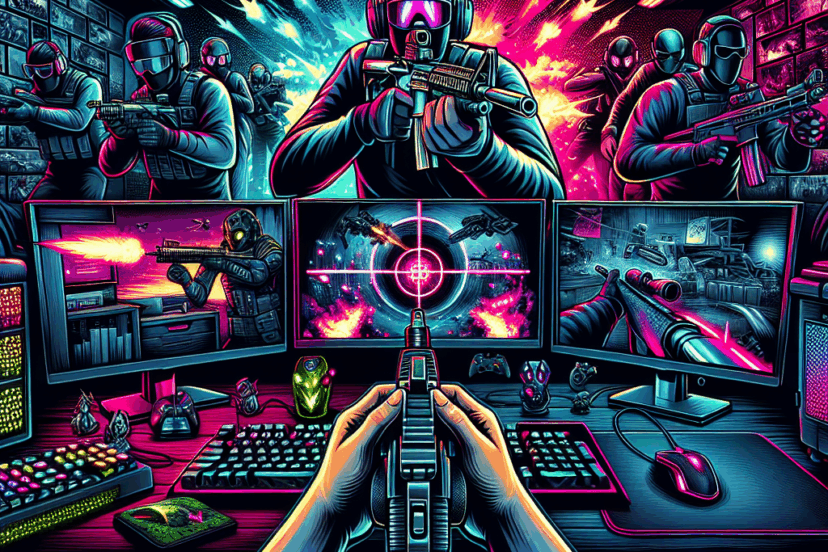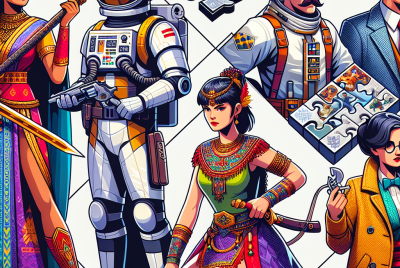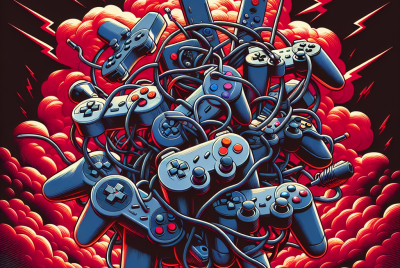Retro Games That Defined Their Era and Remain Awesome
Retro Games That Defined Their Era and Remain Awesome
1. Super Mario Bros. (1985)
Platform: Nintendo Entertainment System (NES)
Genre: Platformer
Super Mario Bros. is not just a game; it’s a cultural phenomenon that reshaped the video gaming landscape. Released by Nintendo in 1985, it introduced players to the vibrant world of the Mushroom Kingdom where Mario, the iconic plumber, embarks on a quest to rescue Princess Toadstool from Bowser. With its innovative level design, tight controls, and colorful graphics, Super Mario Bros. set a standard for platformers. Its gameplay mechanics, including power-ups like the Super Mushroom and Fire Flower, remain foundational in game development discussions today.
2. The Legend of Zelda (1986)
Platform: Nintendo Entertainment System (NES)
Genre: Action-Adventure
The Legend of Zelda blazed new trails in gaming with its blend of exploration and puzzle-solving. Released in 1986, it introduced players to an expansive world filled with dungeons, secrets, and lore. The open-world concept was revolutionary, allowing players to explore the kingdom of Hyrule at their leisure. The game’s non-linear progression, memorable music, and iconic items like the Triforce and Master Sword helped establish a legacy that persists in modern gaming through multiple sequels and remakes.
3. Pac-Man (1980)
Platform: Arcade
Genre: Maze Chase
Pac-Man, launched in 1980 by Namco, became a symbol of 1980s pop culture. The simplistic yet addictive gameplay had players navigating mazes, gobbling pellets, and avoiding colorful ghosts. Unlike many of its contemporaries that focused on high scores and violence, Pac-Man introduced a non-violent alternative that appealed to a broader audience, including women. The game’s innovative use of AI in the ghost behaviors provided a unique challenge that remained engaging over decades. Its impact can still be seen in modern mobile games and various spin-offs.
4. Tetris (1984)
Platform: Game Boy, PC, and multiple other platforms
Genre: Puzzle
Developed by Russian software engineer Alexey Pajitnov, Tetris became a global sensation after its 1984 debut. The game’s premise – stacking falling blocks to clear lines – may sound simple, but its depth and challenge captured millions. Tetris was instrumental in popularizing the Game Boy and solidified puzzle games’ place in gaming history. Its music, particularly the iconic “Type A” theme, is recognized worldwide, and the game continues to inspire iterations and clones across all gaming platforms.
5. Sonic the Hedgehog (1991)
Platform: Sega Genesis
Genre: Platformer
Sega’s answer to Mario came in the form of Sonic the Hedgehog in 1991. This game established Sonic as a mascot for Sega and introduced a new character to the gaming landscape: a blue hedgehog with supersonic speed. The game’s design emphasized speed and fluid movement through its vibrant levels filled with loops and springs. Its catchy soundtrack and mascot appeal made Sonic not just a game but a franchise, leading to sequels, animated series, and merchandise that remains relevant today.
6. Street Fighter II (1991)
Platform: Arcade and Super Nintendo Entertainment System (SNES)
Genre: Fighting
Street Fighter II redefined the fighting genre with its introduction of diverse characters, each with unique moves and backstories. Released into arcades in 1991, the game offered multiplayer combat that was thrilling and competitive. Its influence led to esports development and the fighting game community’s growth. Street Fighter II became a significant part of pop culture, spawning sequels, adaptations, and cross-franchise collaborations that are still relevant in today’s gaming arena.
7. Final Fantasy VII (1997)
Platform: PlayStation
Genre: Role-Playing Game (RPG)
Final Fantasy VII transformed RPGs with its rich storytelling, 3D graphics, and cinematic cutscenes. Released in 1997 for the PlayStation, it introduced players to the dystopian world of Gaia, where they follow Cloud Strife as he battles the megacorporation Shinra and the enigmatic Sephiroth. The game’s compelling narrative, memorable characters, and innovative battle systems set benchmarks in storytelling within gaming. Its recent remake reflects the lasting relevance and impact this title has had on the genre and gaming at large.
8. Doom (1993)
Platform: PC
Genre: First-Person Shooter
Doom is often credited with laying the groundwork for first-person shooters. Released in 1993 by id Software, it was groundbreaking in its use of 3D graphics, multiplayer modes, and modding capabilities. Players navigate through various levels filled with demons and other monsters, armed with an array of weapons. Doom’s influence on game design, level structure, and even online gaming is profound, with its mechanics echoed in many modern FPS titles. The game’s technical innovations remain a topic of study in game design courses.
9. The Legend of Zelda: Ocarina of Time (1998)
Platform: Nintendo 64
Genre: Action-Adventure
Often hailed as one of the greatest games of all time, Ocarina of Time transitioned the Zelda series from 2D to a fully realized 3D experience in 1998. This title introduced a targeting system that has since become standard in many action-adventure games. Its poignant story, intricate dungeons, and captivating music pushed the boundaries of narrative within video games. Ocarina of Time was revolutionary, setting high standards for 3D game development, which are reflected in the design principles of many contemporary titles.
10. Pokémon Red and Blue (1996)
Platform: Game Boy
Genre: RPG
Pokémon Red and Blue sparked a global phenomenon when they were released in 1996. These games popularized the RPG genre and introduced players to the world of Pokémon—creatures that trainers capture and battle. Its blend of exploration, strategy, and trading made it not only a hit but also a cultural sensation that spawned a franchise including TV shows, movies, card games, and merchandise. The Pokémon formula of creature collection and battling remains a core mechanic in many modern games, validating its lasting legacy.
11. Castlevania: Symphony of the Night (1997)
Platform: PlayStation
Genre: Action-Adventure, Metroidvania
Castlevania: Symphony of the Night elevated the “Metroidvania” genre through its intricate level design, RPG elements, and atmospheric storytelling. Released in 1997, it encouraged exploration and backtracking, rewarding players with upgrades and new abilities. With its haunting soundtrack and stunning visuals, this title redefined Castlevania and influenced countless other games, establishing a template for future titles in exploration-based game design.
12. EarthBound (1994)
Platform: Super Nintendo Entertainment System (SNES)
Genre: RPG
EarthBound is a unique RPG that strayed from typical fantasy settings and embraced a modern-day theme, with quirky humor and heartwarming storytelling. Released in 1994, its relatable characters and unusual gameplay mechanics garnered a cult following. The game’s distinct art style, coupled with its imaginative take on American culture, opened doors for narrative-driven and offbeat experiences in gaming. EarthBound’s continued presence in pop culture exemplifies how innovative and relatable storytelling can resonate with audiences long after its release.
13. GoldenEye 007 (1997)
Platform: Nintendo 64
Genre: First-Person Shooter
GoldenEye 007 revolutionized the first-person shooter genre on consoles upon its 1997 release. Based on the James Bond film, it allowed players to experience immersive gameplay through clever level design and exceptional multiplayer modes. The game’s mechanics, including stealth elements and diverse multiplayer options, transformed console gaming and laid the groundwork for future FPS titles. Its innovative use of split-screen multiplayer became a staple in gaming, fostering social gaming experiences.
14. Half-Life (1998)
Platform: PC
Genre: First-Person Shooter
Half-Life changed how stories were told in first-person shooters. Released in 1998 by Valve, it combined a compelling narrative with engaging gameplay mechanics. Players control Gordon Freeman through a research facility overrun by aliens, where environmental storytelling replaced traditional cutscenes. This innovative approach pushed the boundaries of the FPS genre and influenced countless game developers. The game’s impact is still felt today, with its model for merging storytelling with interactive gameplay being widely adopted.
15. Resident Evil (1996)
Platform: PlayStation
Genre: Survival Horror
Resident Evil set the standard for the survival horror genre with its tense atmosphere, strategic gameplay, and resource management. Released in 1996, it introduced players to a world filled with zombies and monstrous creatures within the Spencer Mansion. The use of fixed camera angles and pre-rendered backgrounds created a cinematic experience, heightening player immersion. Resident Evil’s critical success spawned numerous sequels, remakes, and adaptations, cementing its place in gaming history and influencing the design of horror games for years to come.
These retro games have not only defined their eras but have introduced innovations and established legacies that continue to inspire game developers and delight players around the world. Their timeless appeal reaffirms the bond between gaming and culture, illustrating how iconic titles can carve lasting impressions across generations.




